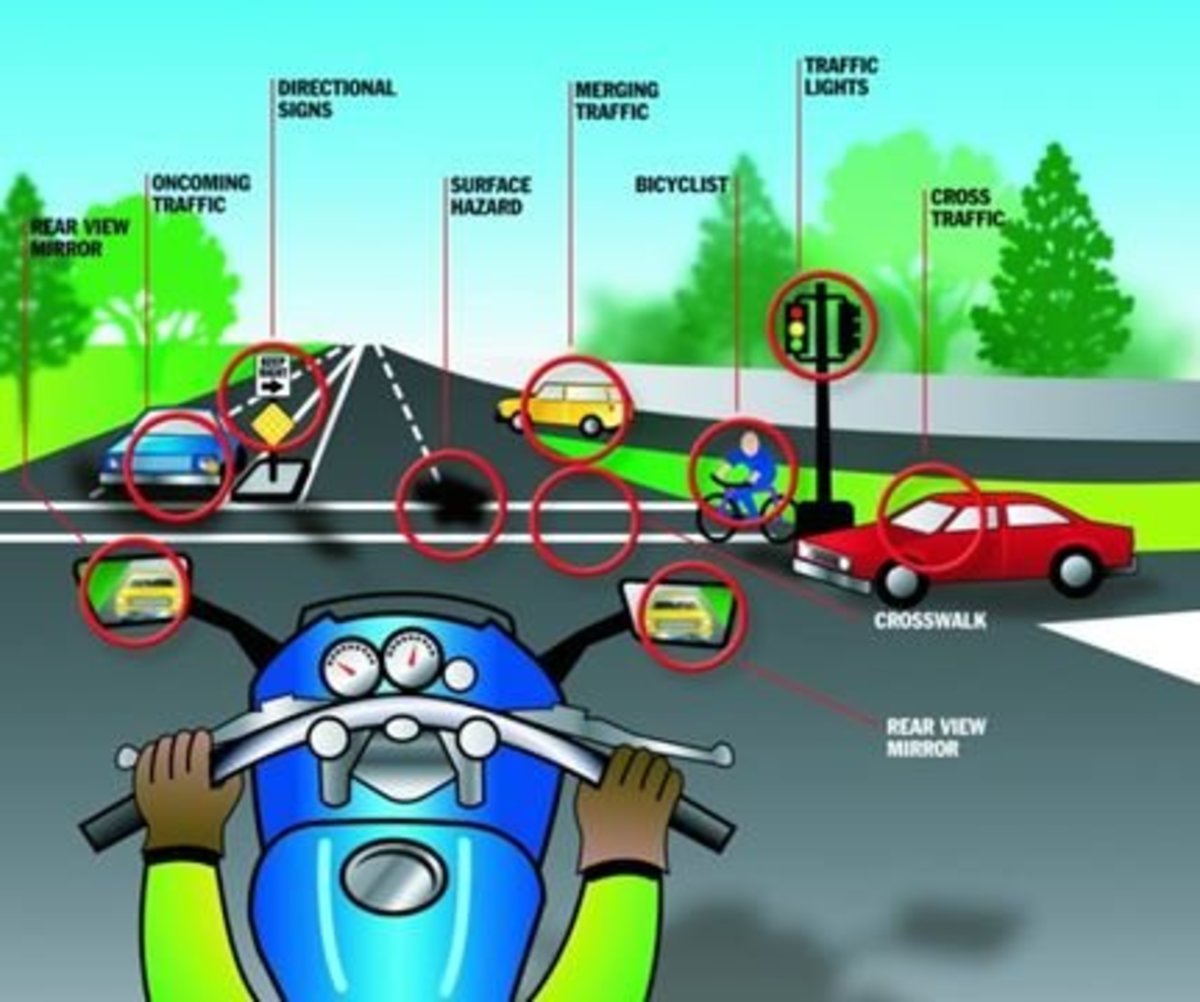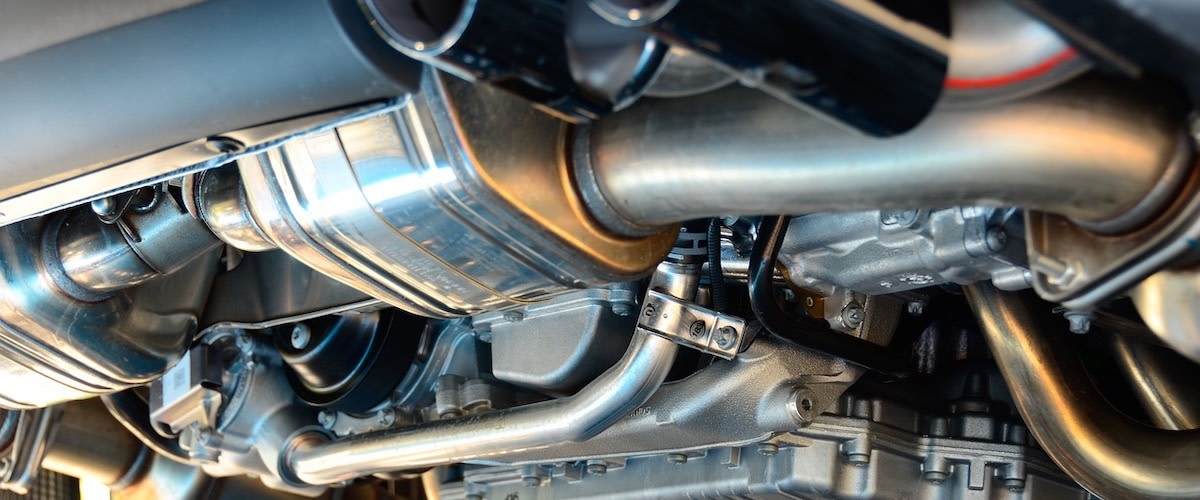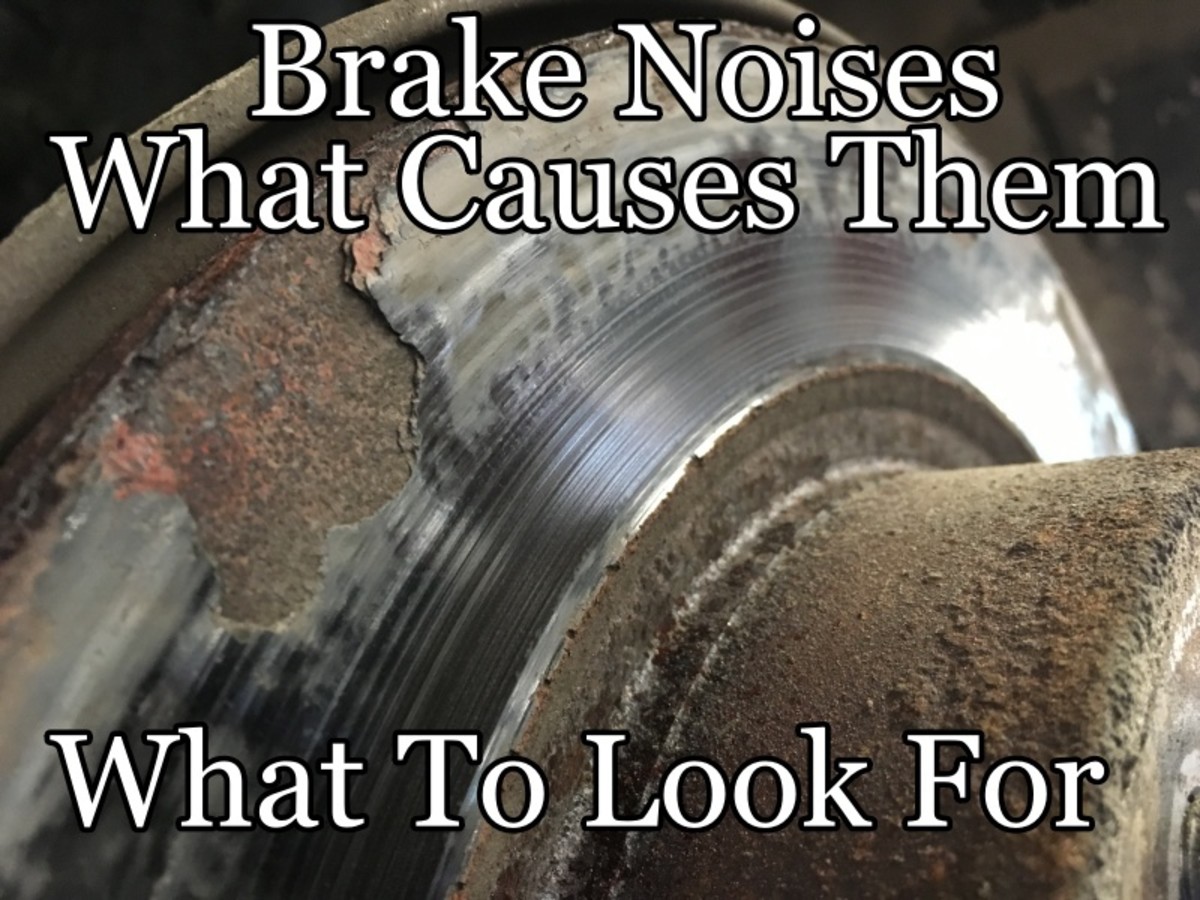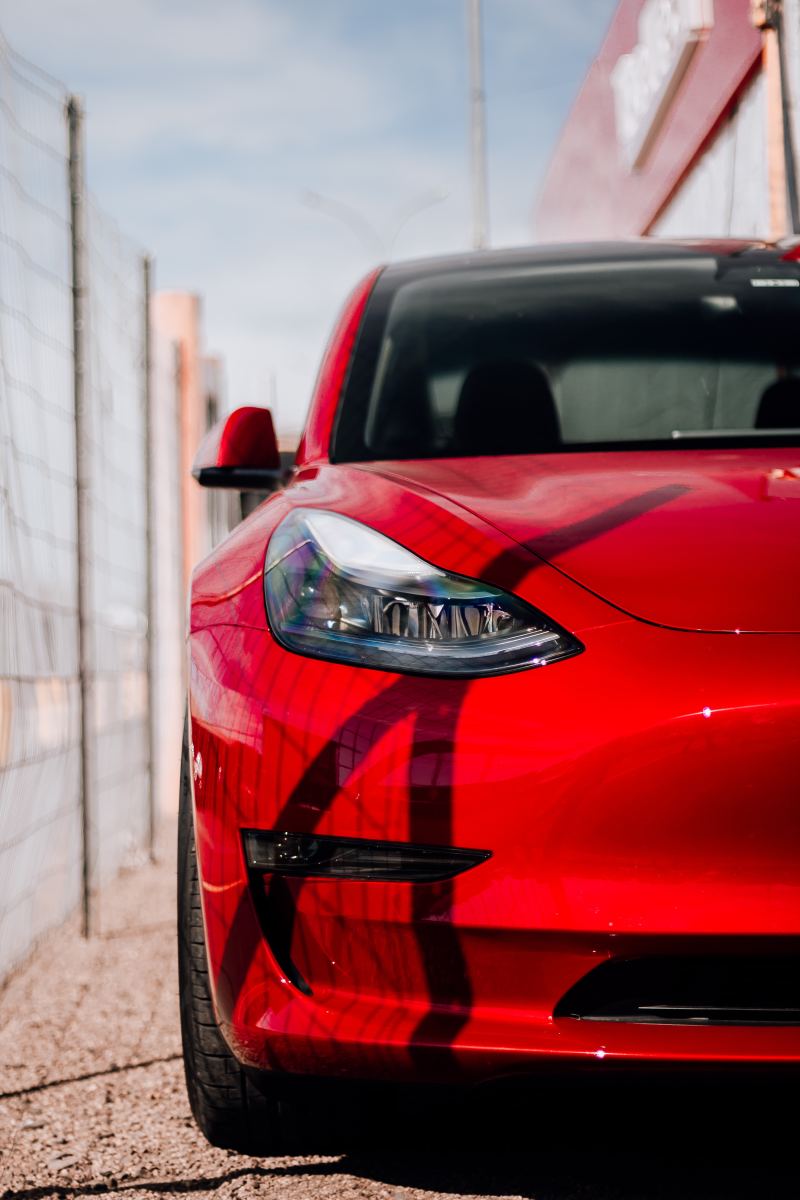The Biggest Auto Recall in U.S. History Is in Effect Worldwide After 24 People Died and Over 200 Injured
A worldwide recall is in effect for the millions of vehicles containing Takata airbags known to be faulty and deadly. This is the largest, most complex vehicle recall in U.S. history according to the U.S. Department of Transportation’s National Highway Traffic Safety Administration (NHTSA).
In the U.S. alone, it currently involves 19 vehicle manufacturers, 50 million vehicles, and over 65 million Takata airbag Inflators that have already claimed the lives of 24 victims and injured more than 200 others.
This recall already broke the record set in 2004 of 30 million recalls and by December of 2019, more recalls are scheduled to take place that will bring the total number of recalls up to nearly 70 million nationwide and 100 million worldwide.
Critical Details Concerning This Recall that Consumers Should be Made Aware of
The first thing to note is that not all vehicles that contain these dangerous, defective Takata airbags have been recalled as of this time. Out of 70 million automobiles that these faulty airbags have been installed in, only 50 million have been recalled so far. Thus, the remaining vehicles are scheduled to be recalled by December of 2019.
Therefore, just because your car has not been recalled, doesn’t mean you are out of the danger zone yet since it may still be scheduled to be recalled soon. What you can do in the meantime is, check your owner’s manual for details on the airbags installed in your vehicle, or if you purchased the car from a dealership, try contacting them.
This brings us to another critical detail you should know about; whoever sold or rented you your car, whether it’s a dealership, a rental company, or a seller off the street, is not required to let you know if the vehicle is under recall.
Another thing to note is that certain vehicles pose a much bigger threat of airbag explosions than others. These vehicles include:
• Mazda B-Series trucks
• 2006 Ford Rangers
• Certain 2001-2003 Acura and Honda vehicles.
What Makes Takata Airbags So Dangerous?
What makes these airbags so dangerous is that Takata failed to add a drying agent while using ammonium nitrate in the airbag propellants to create an explosion that would inflate the airbags. Therefore, when exposed to moisture/ humidity or high temperatures, ammonium nitrate may degrade and deteriorate. A degraded ammonium nitrate propellant and ignition of an airbag inflator can explode forcefully and shatter the inflator/container sending sharp metal pieces, known as shrapnel, flying into the cabin which can injure or kill both the passenger and driver.
Many people have died horrifically and a lot more were injured due to these defective airbags exploding and sending shards of metal into their necks, faces, and heads. Some of the less fortunate were hit in the neck cutting into their carotid artery and causing them to bleed to death, some within minutes. Others suffered severe brain wounds which resulted in death.
Because containing these airbags in high humidity and/or extremely hot temperatures pose the biggest threats, recalls are being carried out first in high-humidity areas and regions with extremely hot temperatures.
Fatalities Caused by Takata’s Faulty Airbags
All it takes is a hit big enough to deploy the airbags in your vehicle for — what might have been a small fender bender accident — to turn deadly. Many of the accidents that caused the airbags to burst were small hits taken by slow-moving vehicles. The following incidents highlight the dire consequences that some of the unfortunate victims underwent due to faulty automotive safety equipment. Our hearts and prayers go out to them and their loved ones mourning such a tragic loss.
Ashley Parham - May 27, 2009
On May 27, 2009, tragedy struck 18-year-old Ashley Parham, just days after celebrating her high school graduation. She was on her way to pick up her brother from school in her 2001 Honda Accord and while looking for a place to park in the high school parking lot, she collided with another vehicle.
Although the collision was minor, the impact was enough to trigger the deployment of the airbags. Instantly they ignited then exploded violently sending shards of deadly metal shrapnel at Ashley, which pierced her neck severing her carotid artery and causing the teenager fatal bleeding.
Ashley was a former cheerleader and a community volunteer with her whole life ahead of her but she was taken from us tragically, even though she was following all the rules by wearing her seatbelt and driving slowly according to News 9 a local news TV station. While Takata and Honda didn’t take the fault they did, however, agree to an undisclosed settlement with Ashley’s family.
Hai Ming Xu – September 13, 2013
On September 13, 2013, Hai Ming Xu was driving down the streets of Alhambra, California in his 2002 Acura when he struck a building. The degraded airbags were deployed, and the inflator exploded hurling metal shards right into his face. Hai Ming’s face was severed so badly that responders thought he was shot in the face several times. It wasn’t until the coroner’s report came out that they knew what caused the fatal incident. Mr. Xu suffered severe facial trauma that resulted from fragments of metal objects that broke off the airbags.
Nichol Lynn Barker - July 19, 2017
On July 19, 2017, 34-year-old Nichol Lynn Barker was driving in Holiday Florida with her mom and her two children in the car when another driver failed to yield the right of way and struck her 2002 Honda Accord. Her airbags deployed and the propellants detonated, sending shards of shrapnel throughout the cabin.
Fortunately, Nichol’s kids and mom survived the incident with just a few minor injuries. Unfortunately, Nichol didn’t make it; she suffered severe traumatic brain and facial injuries due to the metal fragments darting from the airbags and was pronounced dead at a hospital nearby. According to the accident report, Ms. Barker sustained a skull fracture, a large gaping wound near her left temple, and bleeding of the brain leading to her untimely death.
Ramon Kuffo - June 18, 2016
On June 18, 2016, Ramon Kuffo was working on the interior of his 2001 Honda Accord. While sitting in the driver’s seat, Ramon was tapping something with a hammer causing his airbags to unexpectedly deflate, ignite, and explode, shooting fragments of the shattered inflator at him like bullets, which tragically took Ramon's life.
The following is current as of the date this article was published. It contains all the reported fatal incidents that resulted from the defective airbags made by Takata.
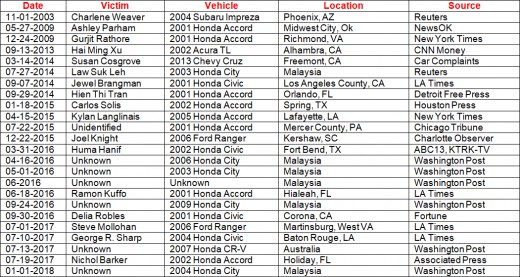
These accounts represent just a fraction of the tragic and heart-wrenching incidents still to come. Confidential disclosures from some of Takata's top employees, who prefer to remain anonymous, shed light on the extensive testing failures that went unnoticed behind the scenes. So why didn’t they stop selling these airbags to auto manufacturers sooner? And why did so many people have to die before the truth finally came out? It's truly devastating to contemplate that these people would still be with us today if the alarming issues surrounding Takata's failed airbag tests had been brought to light sooner.
Unfortunately, many people are still driving around with these faulty airbags without any idea of the danger they are in, and not enough people are talking about this. Therefore, please share this information. It could save someone’s life and prevent others from getting hurt.
Ensuring Safety: Steps to Check if Your Car is Under Recall and What to Do Next
The defective airbags referred to as “Alpha” airbags, are manufactured by a company in Japan called “Takata”. Anyone operating a vehicle containing Takata Alpha airbags is in great danger.
To find out if your vehicle is on the list of recalls, write down your vehicle identification number or VIN # then click here to visit the website set up by the NHTSA. Your car’s VIN # can usually be found on your car title, registration, and insurance policy, on the driver’s side door jamb, or on the top of the dashboard on the driver’s side, viewable through the window from outside.
If your vehicle contains Takata "Alpha" airbags, manufactured by the Japanese company Takata, it poses a serious safety risk. To determine if your car is subject to a recall, follow these steps:
Step 1: Locate Your VIN#
Locate your Vehicle Identification Number (VIN), typically found on your car title, registration, insurance policy, driver’s side door jamb, or dashboard.
Step 2: Visit the NHTSA Website and Check Your Vin#
Visit this website established by the NHTSA and enter your VIN to check if your vehicle is listed for a recall.
If your car is listed for a recall:
- Cease driving the vehicle until the airbags are replaced.
- Contact your dealer or car manufacturer for guidance on replacing the airbags free of charge. They may also provide a loaner vehicle until your car is safe to drive.
If your car is not listed for a recall, don’t get too excited. Your car can still have Takata airbags installed and is merely pending recall. In this case:
- Identify the manufacturer of your airbags and if it is Takata, refrain from driving the vehicle until the airbags are replaced.
- Contact your dealership or car manufacturer to arrange for free replacement of the airbags.
Conclusion
According to CNN Business, of every 7 cars driven across the U.S., at least one has a Takata airbag installed. This statistic is staggering and suggests a significant threat to public safety. It's alarming to realize that you’re not safe driving your own car anymore since your car may have hidden threats lurking.
Not long ago, between 2014 and 2015, a tragic toll was inflicted by faulty ignition switches, resulting in the loss of over 120 lives. At that time, the recall affected just 8.4 million vehicles. With the current recall surpassing 100 million vehicles, the scale of the potential risks for tragedy is astounding, raising concerns that the death toll could skyrocket soon.
Unfortunately, many vehicles equipped with flawed airbags are still being driven down U.S. streets and highways as owners are unaware of this impending danger. That’s why it's imperative to raise awareness about the Takata Airbags recall and the serious hazards it poses.
Please inform as many people as possible about the importance of checking their vehicles for Takata airbags. Public awareness and action are crucial steps in mitigating the risks associated with this widespread automotive safety issue and preventing horrific deaths from occurring.
Was Your Car on The Recall List? Or, Do you Know Someone Who Had Their Airbags Replaced Due to This Recall?
Please let us know in the comment section below and feel free to update or add to the information contained in this article.
This content is accurate and true to the best of the author’s knowledge and is not meant to substitute for formal and individualized advice from a qualified professional.
© 2019 vegasmisha

